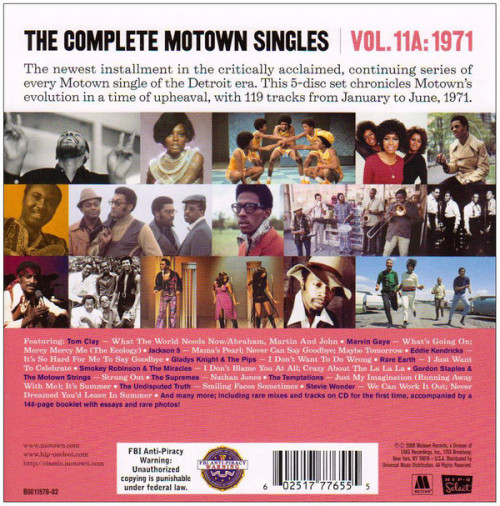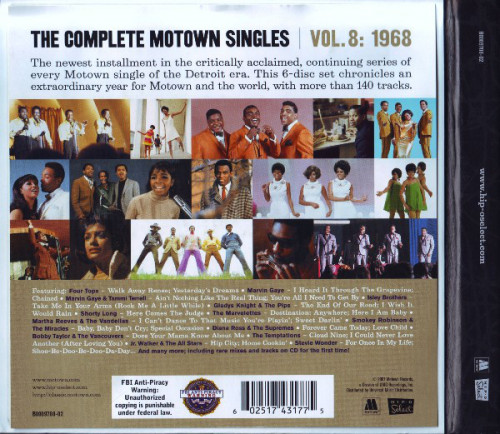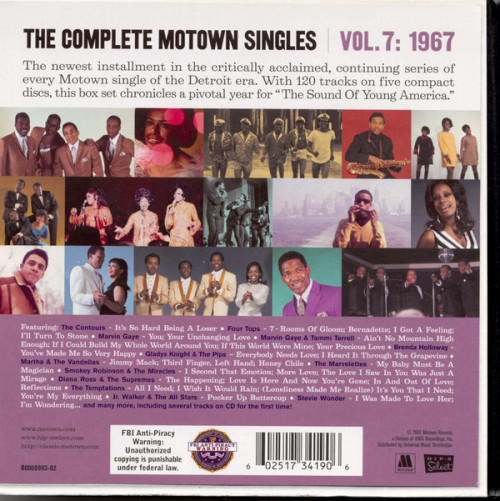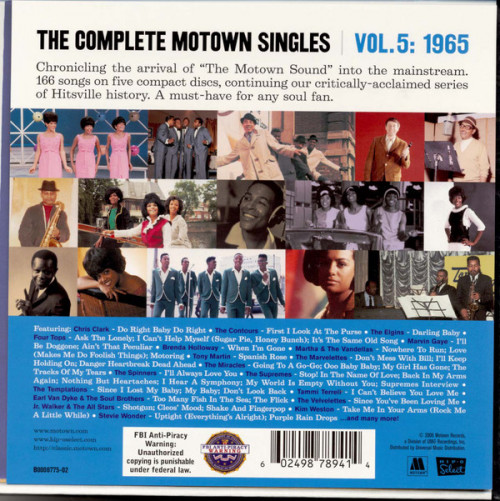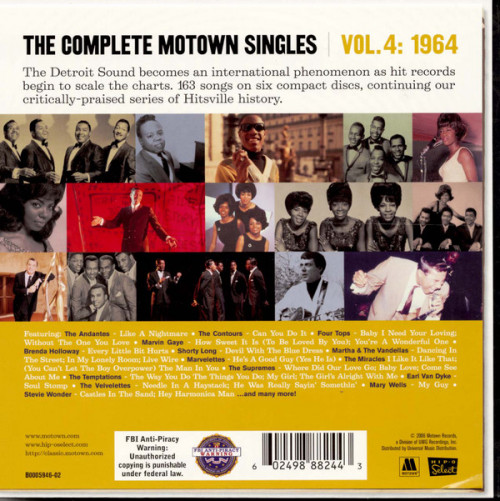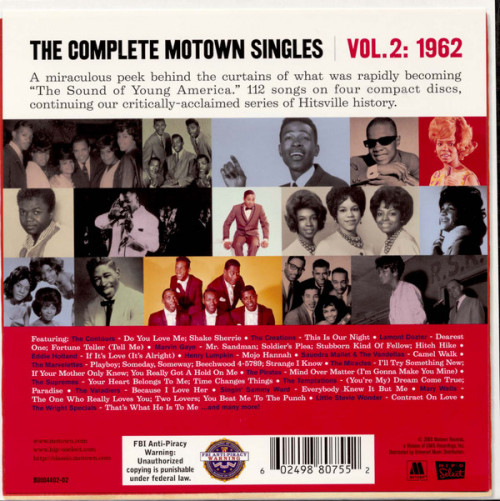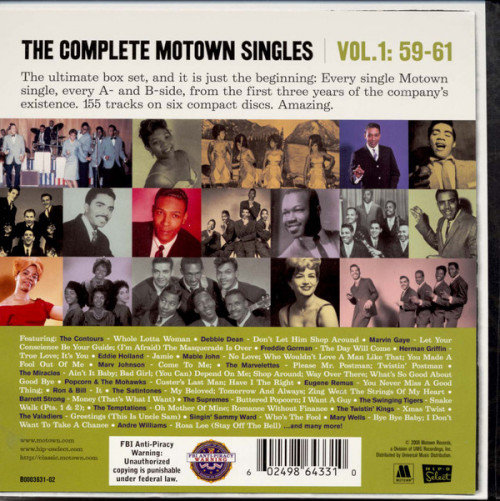Showing posts with label Motown. Show all posts
Showing posts with label Motown. Show all posts
VA - The Complete Motown Singles Vol. 3 (1963) [5 CD, 2005/FLAC]
The Motown label crafted a uniform house sound so instantly identifiable that "Motown" unequivocally became a style unto itself. During the '60s, Berry Gordy, Jr.'s Detroit label became the biggest independent in the music industry, thanks to its smooth, sophisticated blend of R&B and memorable pop melodies.
Earl Van Dyke - The Motown Sound: The Complete Albums & More (2 CD, 2012/FLAC)
2012 two CD collection devoted to the works of Motown session keyboardist (and Funk Brother extraordinaire) Earl Van Dyke. Originally, some of the Hitsville studio musicians would be ''allowed'' to cut soulful Blues and Jazz tracks for the company's Workshop Jazz label, as long as they handled the regular gig, cutting hits on the Hitsville U.S.A. assembly line. By 1964, however, Workshop Jazz was dead. Motown made good on their promise, somewhat, giving Earl Van Dyke a rare opportunity in the spotlight by issuing in his name a single and a subsequent LP, That Motown Sound. Earl's artistic disappointment belies the gems contained within those vocal-less Motown hits and the additional bonus tracks from Motown's vaults that comprise Disc One of this set. Additional previously unheard nuggets can be found amongst the bonus tracks on Disc Two.
VA - The Complete Motown Singles Vol. 8 (1968) [6 CD, 2007/FLAC]
Artist development at Motown was comprehensive.
Equal parts finishing school and academy of popular arts, the company
provided its acts with elaborate choreography under the tutelage of Cholly Atkins. Young women raised in public housing
projects, like the Supremes, were schooled in the social graces, and
chaperones accompanied the package-tour bus cavalcades that brought
Motown to other parts of the United States during the company’s early
years.
VA - The Complete Motown Singles Vol. 7 (1967) [5 CD, 2007/FLAC]
Motown had an extraordinary house band (known as the Funk Brothers) made up of some of the best nightclub and bar musicians in Black Detroit, including Earl Van Dyke on keyboards, Benny Benjamin and Uriel Jones on drums, and James
Jamerson on bass. They played a huge role in the development of the
Motown sound, a branch of soul music that featured more sophisticated
arrangements and orchestration than the grittier Southern soul that
contemporaneously flourished at as the Memphis Sound.
VA - The Complete Motown Singles Vol. 6 (1966) [5 CD, 2006/FLAC]
Not only did Motown’s acts become famous but its songwriters and producers also became household, or at least familiar, names. Brian Holland, Lamont Dozier, and Eddie Holland,
who wrote and produced most of the Supremes’ mid-1960s hits, were
nearly as famous as the Supremes themselves, and their squabble with
Gordy over money, which resulted in a nasty lawsuit and their departure
from the company, was major industry news. Robinson was an important
songwriter at Motown, as were Sylvia Moy, Norman Whitfield, Mickey
Stevenson, Ivy Joe Hunter, and Gordy himself. All these songwriters were
also producers. Some were assigned by Gordy to work with specific acts.
Such fame did some of Motown’s writers achieve and such problems did
their fame cause for Gordy that, when the Jackson 5 were signed by the company in 1969, the team that wrote the group’s early hits was credited simply as the Corporation.
VA - The Complete Motown Singles Vol. 5 (1965) [6 CD, 2006/FLAC]
No Motown act of the 1960s matched the success of the Supremes, a girl group that scored number-one hits with “Where Did Our Love Go,” “Baby Love,” “Come See About Me” (all 1964), “Stop! In the Name of Love,” “Back in My Arms Again,” “I Hear a Symphony” (all 1965), and “You Can’t Hurry Love” (1966). Not only were they the second most successful singing group of the decade—surpassed only by the Beatles—but they remain the most successful female singing group of all time. The group’s glamorous lead singer, Diana Ross, went on to a remarkable solo career as a singer and a moderately successful career as an actress.
VA - The Complete Motown Singles Vol. 4 (1964) [6 CD, 2006/FLAC
Motown often utilized the same core session musicians on their records, which helped lay the Motown sound's basic rhythmic foundation of bouncing bass and echoing drums. But their arrangements were frequently lush and elaborate, adding strings, horns, woodwinds, piano, extra percussion, or whatever else might enhance the music's urbane stylishness. This polished pop craftsmanship, when matched with the smoothly soulful vocals of the Motown artist roster, became ubiquitously popular during the early '60s, with songwriters like Smokey Robinson and the team of Eddie Holland, Lamont Dozier, and Brian Holland turning out one gem after another with almost assembly-line regularity.
VA - The Complete Motown Singles Vol. 2 (1962) [4 CD, 2005/FLAC]
Motown played an important role in the racial integration of popular music as an African American-owned label that achieved crossover success. In the 1960s, Motown and its subsidiary labels (including Tamla Motown, the brand used outside the US) were the most successful proponents of the Motown sound, a style of soul music with a mainstream pop appeal. Motown was the most successful soul music label, with a net worth of $61 million. During the 1960s, Motown achieved 79 records in the top-ten of the Billboard Hot 100 between 1960 and 1969.
VA - The Complete Motown Singles Vol. 1 (1959-1961) [6 CD, 2005/FLAC]
Motown Records is an American record label owned by the Universal Music Group. It was founded by Berry Gordy Jr. as Tamla Records on January 12, 1959, and incorporated as Motown Record Corporation on April 14, 1960. Its name, a portmanteau of motor and town, has become a nickname for Detroit, where the label was originally headquartered.
Subscribe to:
Comments (Atom)










